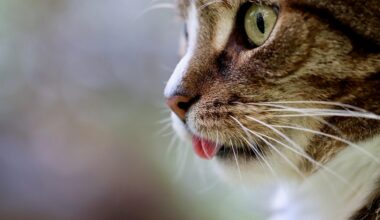Addressing Concerns About Cat Breeding Conditions
When it comes to cat breeding, many individuals may feel concerned regarding the welfare of felines involved in the process. It is crucial to address these concerns sincerely and openly. Animal welfare advocates often raise alarms about potential abuses in breeding practices. Breeders must adhere to high standards of care, ensuring safe and healthy living conditions for the animals. A lack of transparency can lead to distrust, making it essential for breeders to maintain clear communication with clients and the community. This transparency serves not just to alleviate worries but also to showcase ethical breeding practices. Moreover, potential cat owners should remain informed about what acceptable breeding conditions should look like. Adequate knowledge enables them to ask the right questions. Comprehensive regulations govern cat breeding, further protecting animals from negligent owners or unethical breeding facilities. Engaging in responsible breeding is not just an aspect of business; it fosters lasting relationships built on trust between breeders, pet owners, and advocates. To guarantee transparency, breeders ought to offer tours and access to documentation, showcasing the high standards they adhere to in caring for their cats, thus lessening the apprehensions surrounding cat breeding practices.
Concerns about breeding conditions often arise from real-life cases of abuse and neglect, which should not be taken lightly. The welfare of these animals should be paramount, and it is our responsibility to report any suspected cruelty or violations of animal rights. In light of this, it becomes increasingly important for cat breeders to institute transparent procedures and maintain communication with prospective cat owners. Upcoming owners often ask about health checks, living conditions, and overall care. A reputable breeder will be eager to provide this information, clearly outlining their practices and the steps taken to ensure cats are healthy and well-cared for. Ethical breeders recognize the significance of a transparent breeding process; thus, they proactively share their insights with potential owners. Furthermore, all adopted cats should come with proper documentation, including health records and any certifications that demonstrate their well-being. Providing such documentation not only helps to build trust but also empowers owners to make well-informed decisions about their future pet. Part of responsible breeding includes being active within the community, attending events that promote animal rights while also continually educating themselves about best practices and emerging standards for their craft.
Importance of Ethical Breeding Practices
Ethical breeding practices sit at the forefront of cat breeding operations aimed at ensuring the well-being of these delightful companions. Breeders must understand that their role extends beyond merely producing cats for sale; it requires a deep commitment to breed responsibly. This commitment includes comprehensive knowledge of genetics, health screenings, and the importance of socializing kittens properly. After all, a healthy and well-adjusted cat is a product of responsible breeding practices. Illustrating the significance of these ethical considerations can alleviate common concerns. Breeders should prioritize the health of their breeding cats, screening them for hereditary diseases and conditions. Additionally, contributions to feline education through workshops and seminars strengthen the breeding community. Advocates emphasize the importance of cat education to foster a deeper understanding among owners. Breeders that are active in educating others also strengthen their position within the community. Regular follow-ups with cat owners further demonstrate a sincere commitment to their well-being. By addressing these aspects, many of the concerns regarding cat breeding conditions can subside, resulting in a healthier and more responsible breeding environment conducive to raising well-adjusted kittens.
Ensuring that breeding cats receive adequate veterinary care plays a crucial role in alleviating worries about breeding conditions. Work with veterinarians to develop health programs for breeding cats, allowing them to receive regular check-ups and vaccinations. Good breeders actively engage their vets to ensure the health and well-being of their cats. In turn, this not only enhances the health of the breeding stock but also reassures future cat owners that responsible care is being taken. Moreover, it fosters a breeding environment where animals can thrive emotionally and physically. A nurturing environment is critical for bringing up kittens who are easier to socialize and integrate into family life. Consequently, potential cat owners should always inquire about the health practices employed by breeders. They should feel empowered to ask about the health certifications of both the kittens and the breeding parents. When breeders are transparent and collaborative, they can create an atmosphere of trust while enhancing the perceived value of their operations. It is imperative that breeders maintain a strong network of veterinary professionals who understand the importance of proper feline care for both commercial and non-commercial breeding practices throughout their career.
Creating a Supportive Community
Building a supportive environment for breeders, owners, and advocates can greatly impact the quality of cat breeding practices. Establishing relationships among various stakeholders allows breeders to expand their knowledge base while also creating a network of support for education and outreach. Open discussions about best practices can help foster better breeding environments where all parties feel informed and engaged. Additionally, leveraging social media platforms enables ethical breeders to showcase their commitment to care. Engaging content about cat care tips, health information, and the importance of socialization can resonate well with potential cat owners. Such initiatives can improve the overall community’s understanding of what ethical breeding entails. Hosting workshops and educational programs within local communities can be beneficial, introducing new and experienced breeders to industry standards and best practices. Collaboratively working towards shared goals creates a stronger breeding culture that prioritizes the welfare of the cats. Furthermore, an engaged community can diminish negative perceptions surrounding breeders by emphasizing transparency, education, and quality care for their feline companions. Bridging gaps between breeders, veterinarians, and advocates promotes better outcomes across the board and enhances the lives of the cats produced by these operations.
Monitoring or reporting breeders that fall short of ethical practices is important and necessary to create a landscape where the well-being of animals is prioritized. Responsible breeders should be open to inspections and willing to comply with regulations, demonstrating their commitment to ethical standards. If there are instances where unethical practices are discovered, it’s crucial that community members are empowered to speak up and report their concerns. Most cities have local animal control services that can perform site inspections when needed. Community vigilance can significantly impact the future of cat breeding by holding unethical breeders accountable while rewarding those that adhere to high standards. This level of accountability encourages better practices, resulting in a more positive reputation for cat breeders overall. Each concerned individual can contribute to changing the perception surrounding breeding by demanding ethical treatment of all animals involved. By diligently monitoring breeding practices, the community will benefit from increased quality of life for both cats and their owners. Educated consumers lead the charge in seeking out responsible breeders. By doing so, the collective effort can bring about meaningful change in the industry while fostering responsible breeding awareness among cat owners.
Final Thoughts and Best Practices
In closing, addressing concerns surrounding cat breeding conditions is crucial for securing a brighter future for the felines involved. It requires the concerted effort of breeders, owners, and animal advocates to foster an environment where ethical practices are the norm. Educating potential cat owners about responsible breeding and the significance of ethical treatment fosters a brighter future for our furry companions. Be proactive in seeking out reputable breeders to ensure your chosen cats are healthy and well-cared for. Advocating for higher standards not only benefits the animals but also enriches the entire breeding community. Encourage a culture of transparency and open dialogue among breeders about their practices and health protocols. Heightened awareness among consumers can lead to more informed choices, ultimately leading to better outcomes for cats. Breeders must be willing to share their expertise and demonstrate a commitment to ethical practices. By continuously educating themselves on best practices and innovations in veterinary care, they further contribute to a brighter future. If all parties work collaboratively while striving for ethical improvements and upholding high standards, we can look forward to a positive evolution in the world of cat breeding, ensuring the health and happiness of countless furry companions.
This is another paragraph with exactly 190 words…





